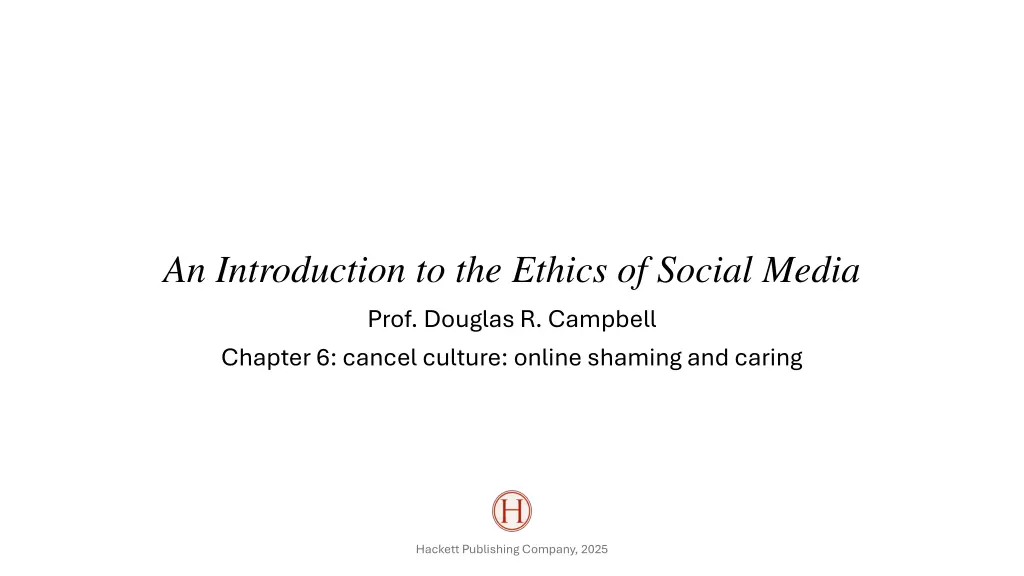
Ethics of Social Media: Cancel Culture Insights
Explore the ethics of social media in relation to cancel culture, online shaming, and caring. Delve into the nuances of public shaming, disproportionality, imaginal relationships, co-deliberation, and the upsides and revisions of cancel culture. Understand the implications of withdrawing support, disproportionate punishments, imaginary relationships, and the impact on co-deliberation in moral discussions. Gain insights on how cancel culture can be revised to support moral improvement and growth in individuals.
Download Presentation

Please find below an Image/Link to download the presentation.
The content on the website is provided AS IS for your information and personal use only. It may not be sold, licensed, or shared on other websites without obtaining consent from the author. If you encounter any issues during the download, it is possible that the publisher has removed the file from their server.
You are allowed to download the files provided on this website for personal or commercial use, subject to the condition that they are used lawfully. All files are the property of their respective owners.
The content on the website is provided AS IS for your information and personal use only. It may not be sold, licensed, or shared on other websites without obtaining consent from the author.
E N D
Presentation Transcript
An Introduction to the Ethics of Social Media Prof. Douglas R. Campbell Chapter 6: cancel culture: online shaming and caring Hackett Publishing Company, 2025
Cancellations (1) Canceling is a form of public shaming. Canceling someone is a matter of withdrawing any kind of support (viewership, social-media follows, purchases of products endorsed by the person, etc.) for those who are assessed to have said or done something unacceptable or highly problematic, generally from a social-justice perspective especially alert to sexism, heterosexism, homophobia, racism, bullying, and related issues. The public shame is part of the withdrawal of support.
Disproportionality (1) Since canceling is a form of public shame, it runs a certain risk that shaming someone privately doesn t. It invites punishments that are disproportional to the offense and don t allow any appeal. It is facilitated by self-licensing: when we self-license, we give ourselves permission to do something because we are good people; priming ourselves with the belief that we are good allows us to do something that we would otherwise consider bad.
Imaginal relationships (1) An imaginal relationship is a relationship with someone who is real but is distant from us in one way or another, so we have to rely on our imagination to fill in the gaps for us. Shamers are in an imaginal relationship with their fellow shamers. We have psych research showing that online shamers are motivated by one-upmanship, displaying one s own righteousness, and getting more followers. The well-being of the victim, or even ensuring that the victim gets what they deserve, is not relevant. But the victims are in an imaginal relationship with their shamers, too. The shamers haunt them.
Co-deliberation (2) When we cancel, we sometimes also de-platform and silence. Doing so can undermine co-deliberation. Some philosophers think that important truths, especially about morality, are discovered through co-deliberation: people with different views discussing and arguing with each other about what s right and wrong. But cancel culture has a chilling effect on speech, and we sometimes might cancel someone from whom some important lesson or truth could be extracted. Co-deliberation requires mutual respect, and shaming someone undermines that, too.
Upsides and revisions (3) But some philosophers think that cancel culture is good in at least some respects. Shame can be an important tool for moral improvement. We should revise cancel culture to ensure that shamers believe in the possible growth of those they shame, in order that the shame can be used as a powerful driver of growth.
Shaming in public (4) Public shame can have the benefit of making known to many people what the values of our community are. This can strengthen the sense of the group s commitment to these values. It also helps to establish clear precedents, so that others can see what people in the past were chastised for. Canceling isn t merely moral criticism; it s also about directing the attention of our community to some wrongdoing or violation of our values.
Caring: about, for, and with (5) Social-media apps have created opportunities for new ways of caring. Caring about = seeing that someone has a need that is important. Caring for = taking responsibility for that need and responding to it. Caring with = a collective process of reaching out to and working with others. Dr. Doug Campbell






















